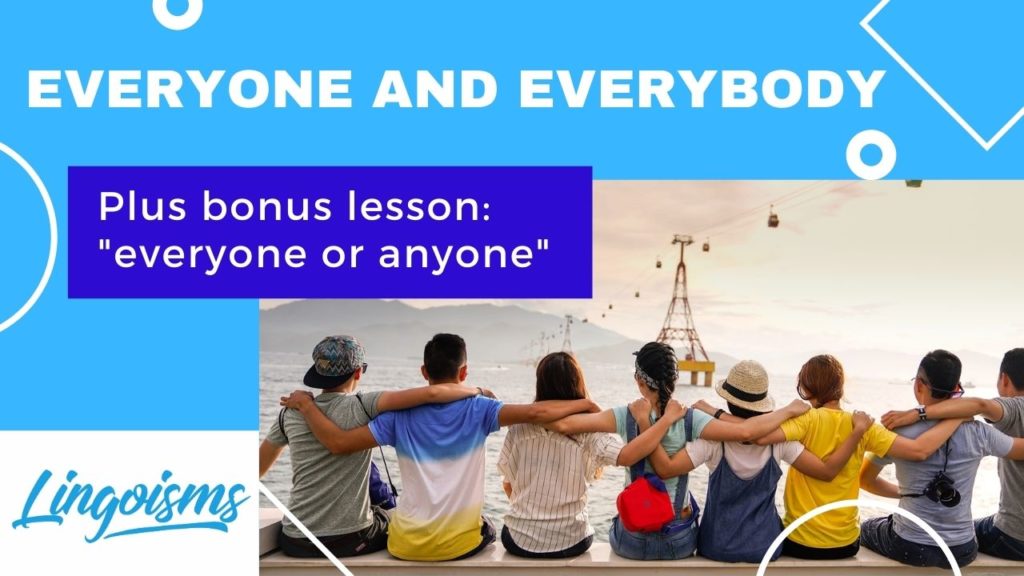A question I get a lot is…”Is there a difference between everyone and everybody? The short answer to this question is…no. 99% of the time you can use either one and no one, even native speakers, will know the difference. However, there is actually a small difference between these words in some situations. To understand these differences, keep reading. Let’s go!
As a bonus, we will also look at the difference between “everyone/everybody” and “anyone/anybody” at the end of the lesson.
Let’s start with how to use “everyone.”
“Everyone” is an indefinite pronoun
It is used to talk about all people doing something individually in a group
It is a little more formal than “everybody”

Next’s let’s look at how to use “everybody.”
“Everybody” is also an indefinite pronoun
It is used to talk about all people doing something together in a group
It is a little less formal than “everyone”

Ok, so when do I use each one?
We use “everyone” when we are talking about a group of people. All people in the group are doing something but each one is doing that thing individually or singularly. That’s why it includes “one” – they are not doing it at the same time.
We use “everybody” also when we are talking about a group of people. All people in the group are also doing something but this time they are doing it at the same time.
Now, this will also make more sense once I create some example sentences with each word.
Example 1
I was happy that everyone in class did their homework. – this means all the students did their homework but they all did it at home, on their own, at different times. They did not do it together.
Everybody did their homework after class in the park. – Here all the students are doing their homework at the same time in the park after class.
Example 2
I called everyone yesterday about the party. – I called all people but I talked with each person individually at different times. I didn’t talk to them at the same time.

I told everybody about the party yesterday while we were shopping at the mall. – This means that I told all people about the party at the same time while we were at the mall.
Example 3
Everyone sent me a birthday card. – This means all people sent a card, but at different times.
Everybody sang “Happy Birthday” at my party. – All people at the party sang “Happy Birthday” at the same time.

In summary…
Basically, “everyone” is used to talk about all people in a group doing something individually and not at the same time.
When we use, “everybody” we are talking about all people in a group doing something at the same time.
However, as I mentioned at the beginning, 99% of the time you can use either one and it will make no difference. So, don’t worry too much about this one because you won’t be making a mistake either way.
Bonus..."everyone" or "anyone"
Now, you may not make a mistake when choosing between the words “everyone” or “everybody” but you might make a mistake when choosing between the words “everyone” and “anyone.” (Remember you can also use everybody and anybody, but as I mentioned before they are basically the same so I will be using only “everyone” and “anyone” from now).
"Everyone"
We have already talked about “everyone” and the main thing to remember here is that all people in the group are doing some action.
Lets say, for example, we have 10 people in a group and we want to know if all people can come to a party, we would use “everyone”
“Can everyone come to my party?” – In this case, we want all 10 people to come to the party. If only 8 people can come, the answer would be NO and we would say…
”No, only 8 people can come, not everyone.”

Lets compare to "anyone"
When we compare “everyone” to “anyone” we can see that with “anyone” not all people need do the action.
Let’s say we have the same 10 people in a group and we want to know if some of (or how many of) the people can come to the party. In this case we would use “anyone.”
eg. Can anyone come to my party? – Here, we just want to know how many people of the 10 people can come, we don’t need all 10 people to come. – If only 8 people can come the answer would be YES, we would say…
”Yes, 8 people can come.”
To summarize...
When you use “everyone,” you need all people to do some action. When you use “anyone,” you don’t need all people to do some action, just part of a group.
I hope that makes sense.
Be sure to remember...
One last thing to remember about “anyone.” – It is used only in questions and in the negative.
For example:
Is anyone anyone coming to the party?
No, there isn’t anyone coming. (Here you could also say, “No one is coming.”)
Quiz: Let’s see how much you learned. (Answers below)
1. After class, (everyone/everybody) gave me their homework.
2. Can (everyone/anyone) sing? I only need 1 person from the group.
3. (Everyone/Everybody) went to the concert in the same bus.
4. “Everyone” is more formal than “everybody.”
a. true b. false
5. There are enough tickets for (everyone/anyone) so you will all get one.
6. We use “everyone” to talk about all people doing something together.
a. true b. false
7. We don’t need (everyone/anyone) to go on the trip, just 50 people would be ok.
8. (Everyone/Everybody), please turn off your phones because the show is starting now.
Answers. 1. everyone 2. anyone 3. everybody. 4. true. 5. everyone. 6. false. 7. everyone. 8. everybody
Well, I hope this lesson helps “everyone” understand more about the difference between “everyone/ everybody” and “everyone/anyone” and how to use them.
As always, thanks for reading!

